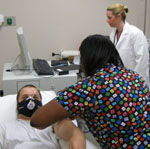|
|

|
New online registry highlights participants
|
by Mary Helen Yarborough
Public Relations
Investing long hours, often seven days a week, clinical researchers are the quiet tigers in pursuit of life-saving discoveries.
Sometimes isolated from the hubbub of the teaching hospital
environment, these researchers function like micro-institutions. They
chase down funds to underwrite their studies, recruit participants who
must meet specific requirements, conduct and manage the research and
assistants, and ultimately discover something new, unique and
significant.
As a way to illuminate these champions of medical discovery, the MUSC
Clinical Trials Registry (CTR), launched recently by the South Carolina
Clinical and Translational Research Institute (SCTR), has begun
highlighting select study teams and participants each month.
CTR, the new online database tool MUSC researchers can use to recruit
study participants, has announced its first Research Team of the Month
and the Research Hero.
The first research team, led by Matthew Carpenter, Ph.D., was chosen
for its work on smoking cessation therapies. The Research Hero is
Keegan Reynolds, who participated in the green tea study led by
Jennifer Donovan, Ph.D.
Reynolds, a Charleston resident, had heard about the green tea study
from his mother and decided, “It wouldn’t hurt to participate in it,”
he said. The green tea study was to determine the efficacy of using
green tea in weight reduction.
For 18 weeks, Reynolds committed to consuming green tea capsules
containing epigallocatechin-3-gallate (EGCG) extract. EGCG is a
chemical in green tea that could aid in weight loss.
 Medical
tech Vernessa Nelson adjusts monitoring devices on study participant,
Keegan Reynolds, who wears a mask used to measure his metabolic rate as
part of his participation in a green tea study led by Dr. Jennifer
Donovan (in the background). Medical
tech Vernessa Nelson adjusts monitoring devices on study participant,
Keegan Reynolds, who wears a mask used to measure his metabolic rate as
part of his participation in a green tea study led by Dr. Jennifer
Donovan (in the background).
“It was really convenient, because they were always able to work around
my schedule,” Reynolds explained. Researchers would also place a mask
on his face to monitor his metabolic rate.
“The mask is actually very comfortable and doesn’t hurt at all,” said the first-time study participant.
Reynolds enjoyed the experience, and is open to participating in future studies.
“Being in the study has been a good overall experience,” Reynolds said.
“Participating in the study has given me the opportunity to participate
in something that I’ve never done before. I also feel like I’ve helped
others out, because hopefully, this study will lead to a discovery that
helps out a lot of people.”
Research Team of the Month
Carpenter has been on a mission to learn more about some of the most
mysterious challenges in human behavior and addiction. For now, that
mission deals with cigarette smoking and the hold it seems to have on
its victims.
An assistant professor and licensed clinical psychologist, Carpenter
describes his study as intellectually stimulating, which drives him to
learn why most smokers can’t seem to quit.
“I was primarily interested because of the intellectual stimulation
that research provides,” Carpenter said. “What I’m studying now won’t
be what I’m studying in five years. The process is always interesting
and progressing. It is the process of conducting research that
interests me, but it is equally important to know that my research is
doing some good in the world.”
He and his team are working diligently to help reduce and eliminate
deaths caused by smoking, the most preventable cause of death in the
United States. Though about 70 percent of smokers say they want to quit
smoking later, many are reluctant to take that step soon enough.
So, Carpenter and his team are looking for ways to help people take that step and overcome the barriers related to quitting.
His team members include Liz Byrd, research analyst; Amy Boatright,
program coordinator; and Nicky Thornley, statistical research analyst.
“If I have helped people to quit smoking, then my research has promoted
health and may have saved lives,” Carpenter. “The entire process of
research is rewarding as well, and I am constantly learning new things.”
“Even basic researchers, who don’t directly see people each day, are
working towards the common goal of improving the lives of others,” Byrd
said.
“I think the most rewarding aspect for me is when they learn something
new about their smoking,” Thornley said. “It is really rewarding
getting to see them have hope, excitement, and belief in themselves
when they realize they can quit with the right support and resources.”
Meanwhile, more than 50 percent of Caucasian smokers have quit, but
only 30 percent of African-American smokers have quit, according to
Carpenter.
“That’s not right,” he said, citing his desire to provide greater diversity among study participants.
“It is critical because we don’t want a body of evidence that is
only good for treating a certain population of people,” Carpenter said.
“We need to help everyone but we can’t do that unless we get a
representative sample of volunteers.
“We need to be able to study African-American smokers in order to find
out why this is the case,” he said. “Treatments do not work the same on
everyone and so it is important for us to study how they work in
different people, especially when certain populations have a higher
likelihood to have a certain disease.”
Visit the registry at http://clinicaltrials.musc.edu.
Nov. 28, 2008
|
|
|



